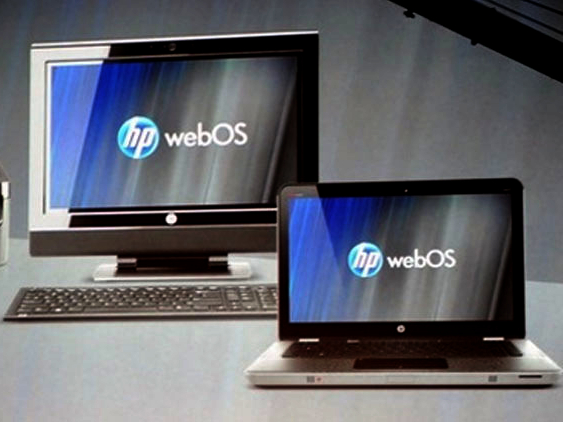HP's webOS Coming to PC
HP's webOS will appear on desktops and laptops by the end of 2011.
Towards the end of HP's two-hour press conference revealing the upcoming webOS-based tablet (TouchPad) and smartphones (Veer, Pre3), the company also revealed that webOS will appear on desktops and laptops towards the end of the year.
For webOS developers, this is a potential market of about 100 million devices per year. That's more than Android, iOS or any other mobile platform today. Yet, what does this mean for HP's relationship with Microsoft? After all, the Redmond-based company currently commands more than 90-percent of the personal computer market with the Windows operating system. HP is also Microsoft’s biggest Windows reseller.
That said, offering desktops and laptops with an internally-developed (acquired) OS would seemingly disrupt the HP-Microsoft relationship. However for now, it seems, that's not the case.
After the HP event, a spokesperson told Business Insider that webOS will not be a Windows replacement. In fact, it will likely ship as a customized user interface running on top of Microsoft Windows (7), similar to HP's TouchSmart Software. Ultimately this should keep webOS developers happy and Microsoft's cash flow uninterrupted.
But as Business Insider points out, webOS on the PC only spells bad news for Microsoft in the long run. Once upon a time Microsoft seemingly ruled the personal computer sector with the only native operating system in town: Windows. Now manufacturers have other options including Ubuntu and Chrome OS. It's assumed that eventually HP will flesh out the PC version of webOS as a full-fledged operating system for HP-manufactured desktops and laptops.
Wednesday HP said that more will be revealed about the PC version of webOS throughout 2011.
Get Tom's Hardware's best news and in-depth reviews, straight to your inbox.

Kevin Parrish has over a decade of experience as a writer, editor, and product tester. His work focused on computer hardware, networking equipment, smartphones, tablets, gaming consoles, and other internet-connected devices. His work has appeared in Tom's Hardware, Tom's Guide, Maximum PC, Digital Trends, Android Authority, How-To Geek, Lifewire, and others.
-
elkein lovely if you really love hpo peripherals, I wonder if they'll bother writing drivers for any of their own older devices, I'll bet not... Or they could just go the apple route and say lalalala I can't hear you on getting IOS to actually do anything besides the apps it ships with.Reply -
dark_lord69 bdcrlsnAh, the smell of competition.Not really...Reply
"it will likely ship as a customized user interface running on top of Microsoft Windows (7), similar to HP's TouchSmart Software. Ultimately this should keep webOS developers happy and Microsoft's cash flow uninterrupted."
Seems to me that this will just be a bit more like software or a very custom version of windows 7. The last part of the article speculates that some day it may become a standalone OS but not now so.. There really isn't any competition. -
reprotected dark_lord69Not really..."it will likely ship as a customized user interface running on top of Microsoft Windows (7), similar to HP's TouchSmart Software. Ultimately this should keep webOS developers happy and Microsoft's cash flow uninterrupted."Seems to me that this will just be a bit more like software or a very custom version of windows 7. The last part of the article speculates that some day it may become a standalone OS but not now so.. There really isn't any competition.webOS is actually based off of Linux.Reply -
rhino13 Last time I ran a PC makers software was when I was 7.Reply
That's when I figured out I could turn it OFF. -
As more and more things become web based the OS will matter less and less.Reply
Except for those of us who want to run commercial programs and real games we still need Windows. We need it to thrive. -
erm HP already has been competing with MS for a while, they push HPUX for workstation class desktops (for business class OS it's actually pretty sweet, especially when it comes to computational intensive applications), webOS would allow them to crack the sub-workstation class desktop, all evidence points to a HP assault on the corporate sector, once they mature webOS on the business sector they will likely refine it for the consumer market although probably still offering it as a consumer option while refining itReply
look at RIM, they survived for as long as they have only because of the corporate market, if the product is good you can happily sustain it on enterprise sales alone, and as much hype and stories we hear about the iPhone they yet to really crack the corporate market (lack of any real security and user control over the device is really hampering them there), if HP plays their cards right they may well be onto a winner without really needing to take away market shares from the iPhone (which is a hard feat) -
COLGeek Well, for years, the open software world has talked about how Linux would rule the desktop someday and you see how far that has come (not). I am a Linux fan and it is never going to happen.Reply
WebOS will make a minimal (likely barely measurable) dent in MS's desktop dominance. It may do well in the netbook/tablet niche, but that is it (and even that will be relative). -
Drag0nR1der I can see it being a 'lite' option to boot in to as well as having Windows for more intensive computing.Reply -
g00fysmiley would be interesting if it were a dual boot option like asus and other notebook/netbok makers used for quick acess to internet browsing liek facebook ... but as a windows overlay i'd have to see it before commentingReply
